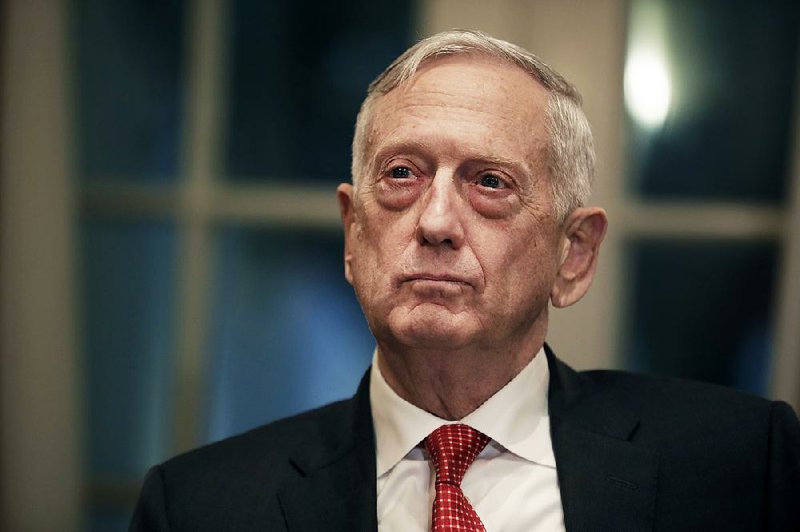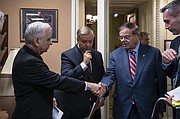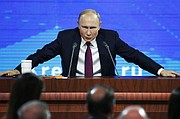WASHINGTON -- Military leaders were scrambling Thursday to devise a swift but safe departure of troops from Syria as lawmakers appealed to President Donald Trump to reverse an abrupt withdrawal order that rattled Washington's Kurdish allies and raised questions about America's perceived reliability as a wartime partner.
Also Thursday, a day after Trump's withdrawal announcement, Defense Secretary James Mattis submitted his resignation, citing differences over military policy with Trump and saying the president deserved someone atop the Pentagon who is "better aligned" with his views.
Meanwhile, defense officials said U.S. airstrikes would continue until all the 2,000 or so U.S. troops are out of Syria, but it was unclear whether the air campaign would then end. Officials said it might depend on whether France and other coalition partners keep ground troops in Syria after the Americans leave. A continued presence of allied troops working with Syrians might compel the U.S. to contribute air cover.
The Pentagon offered no information about how the withdrawal will happen or how long it will take.
Two officials speaking on condition of anonymity to discuss internal planning said Gen. Joseph Votel, head of U.S. Central Command, will submit a comprehensive withdrawal plan to top Pentagon officials in coming days.
One official said military commanders are concerned that the pullout will leave their Syrian Kurdish allies in the lurch.
Sen. Lindsey Graham, R-S.C., said Thursday that Mattis had told him he is worried about the Kurds and this is not the right time to leave.
"The day we leave it's going to be open season on every Kurd who's supported us," Graham told a Capitol Hill news conference, adding that the Syrian regime, the Turks and Islamic State fighters will go after the Kurds "like a pack of wolves."
Mattis and other senior administration officials have argued publicly for months that it would be in the best interest of the United States to remain in Syria long enough to ensure a lasting defeat of the Islamic State militants.
The discord caused Trump to lose Mattis, a Cabinet official who won widespread praise at home and abroad but who experienced increasing differences with the commander in chief he served as Trump's presidency progressed.
Mattis said he would depart the administration Feb. 28 to provide time for a replacement to be identified and confirmed by the Senate.
Mattis pointed to some of those differences in a resignation letter he submitted Thursday to the White House. The retired general emphasized that the United States derives its strength from its relationships with allies and should treat them with respect. He said the country must also be "clear-eyed" about threats including from groups such as the Islamic State.
"We must do everything possible to advance an international order that is most conducive to our security, prosperity and values, and we are strengthened in this effort by the solidarity of our alliances," he wrote.
The Pentagon released the letter moments after Trump announced on Twitter that Mattis would be leaving, saying the retired general would "retire." Trump's tweet made no mention of the fact that the Pentagon chief was leaving over his differences with the president.
"General Jim Mattis will be retiring, with distinction, at the end of February, after having served my Administration as Secretary of Defense for the past two years," Trump wrote on Twitter.
FEARS OF INSTABILITY
On Thursday, the U.S.-backed Kurdish forces warned that the withdrawal of U.S. troops from Syria will allow a revival of the radical Islamic State group and jeopardize the final phase of the battle against the militants.
In its first statement since Trump's announcement Wednesday, the Kurdish-led Syrian Democratic Forces, who have partnered with U.S. troops for years as the key force against Islamic State militants, said the gains made against the militants so far could be reversed if American forces leave.
"The White House decision to withdraw from northern and eastern Syria will negatively affect the campaign against terrorism and will provide its supporters the political and military momentum to recover again," the statement said.
"Withdrawal under these circumstances will lead to instability and insecurity, creating a political and military vacuum, leaving its people between the claws of hostile forces and groups," the statement said. It called Trump's decision "a disappointment."
The militants still hold a string of villages and towns along the Euphrates River in eastern Syria, where they have resisted weeks of attacks by the U.S.-supported Syrian Democratic Forces to drive them out.
The pocket is home to about 15,000 people, among them 2,000 Islamic State fighters, according to U.S. military estimates.
From the start of his administration, Trump had made no secret of his desire to pull out of Syria. But the timing of his announcement Wednesday remains a puzzle. His national security adviser, John Bolton, Mattis and other top leaders argued against the pullout, but were unable to change Trump's mind.
Graham and Sens. Bob Menendez of New Jersey and Jack Reed of Rhode Island say they have growing support for a resolution urging the president to change his strategy. Graham, who usually is a strong Trump supporter, has savaged the pullout decision as wrong-headed, ill-timed and a gift to America's adversaries.
"I can't explain this decision," Graham told reporters. "I'm not going to suggest motivations that are anything other than a frustrated president. But I can promise this: that if you follow through with this everything that happened in Iraq is going to happen in Syria. It's going to be worse, not better. It's going to make it harder to make the Taliban reconcile." His Taliban reference was to U.S. efforts to promote peace in Afghanistan.
On Wednesday, a bipartisan group of six senators, including Graham and Tom Cotton, R-Ark., sent a letter demanding Trump reconsider the decision and warning that the withdrawal bolsters Iran and Russia.
The letter also warned that withdrawing U.S. troops from Syria would "renew and embolden" the Islamic State in the Middle East.
Trump defended his decision Thursday, saying on Twitter: "Getting out of Syria was no surprise. I've been campaigning on it for years, and six months ago, when I very publicly wanted to do it, I agreed to stay longer."
He added: "Does the USA want to be the Policeman of the Middle East, getting NOTHING but spending precious lives and trillions of dollars protecting others who, in almost all cases, do not appreciate what we are doing? Do we want to be there forever?"
The president also pushed back against reports -- which he derided as "Fake News" -- that the U.S. military exit from Syria would advance Russian and Iranian foreign-policy objectives.
PUTIN BACKS PLAN
In Moscow, President Vladimir Putin said he supported the plan and called it "the right decision."
Speaking at Thursday's annual marathon news conference, Putin said he agrees with Trump that the Islamic State group has been defeated, making the U.S. presence in Syria unnecessary.
"I agree with the U.S. president, we have made significant progress in fighting terrorism on that territory and dealt serious blows to [the Islamic State] in Syria," the Russian leader said.
Russia has waged an air campaign in Syria since September 2015, changing the course of Syria's civil war in President Bashar Assad's favor and helping his forces reclaim control over most of the country's territory.
Meanwhile, Turkey, which considers the Kurds a security threat, has said it intends to send its army into Syria to clear them out. Until now, Turkey had to consider the presence of U.S. troops; once they are gone, a bloody clash seems inevitable.
Turkey's defense minister on Thursday said Kurdish militants in Syria would be "buried in their trenches" in any Turkish operation to rout the fighters from the border.
Speaking from the Qatari capital, Doha, Hulusi Akar said Turkey was preparing "intensely" for a military offensive east of the Euphrates River in Syria, where Kurdish-led forces have battled the Islamic State.
The militants have dug trenches and tunnels in the area in anticipation of the operation, Akar said, according to Turkey's official Anadolu news agency.
"But whatever they dig ... when the time comes they will be buried in the trenches," he said. "Of this there should be no doubt."
The U.S.-Kurdish alliance has long angered Turkey, which sees ethnic Kurdish forces as an existential threat to Turkish territory. Turkish officials say that the militants are linked to Kurdish fighters inside Turkey, where the two sides have waged a decades-long war.
Separately, America's Kurdish allies in Syria are discussing the release of 3,200 Islamic State prisoners, a prominent monitoring group and a Western official of the anti-Islamic State coalition said Thursday.
Top officials of the Syrian Democratic Forces met Wednesday to discuss the option of releasing about 1,100 Islamic State fighters and 2,080 relatives of the group's members, according to Rami Abdul Rahman, the head of the Syrian Observatory on Human Rights.
Mostapha Bali, the spokesman for the Syrian Democratic Forces denied there had been any discussion of releasing Islamic State prisoners. "Any news coming from such sources is not reliable and is not coming from us," he said.
But a Western official from the U.S.-led coalition fighting in Syria, which includes more than a dozen countries, confirmed that such discussions had taken place.
"The best result of terrible options is probably for the Syrian regime to take custody of these people," said the official, speaking on the condition of anonymity because he was not permitted to discuss the matter on the record. "If they are released it's a real disaster and major threat to Europe."
Information for this article was contributed by Robert Burns, Lolita Baldor, Matthew Lee and Vladimir Isachenkov of The Associated Press; by Erin Cunningham, Liz Sly, Paul Sonne, Missy Ryan, John Wagner, Robert Costa, Timothy Bella and Anton Troianovski of The Washington Post; and by Hwaida Saad, Rod Nordland and Eileen Sullivan of The New York Times.
A Section on 12/21/2018


